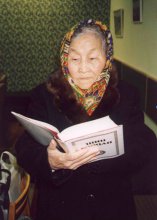 The Kalmyks are famous for their Kalmyk tea, a very special drink with cream, salt and spices, but no sugar. You drink a cup of this tea for breakfast and you do not have to eat any food till lunch time. They boast of their keen eyesight and good teeth thanks to this sugarless diet. The Kalmyks are the only Buddhist people in the whole of Europe, so they should be, and actually are, contemplative in comparison to other Europeans. They have deservedly earned their reputation as calm and peaceful people, who are never in a hurry. They have also earned their reputation as an intellectual nation because they have adopted chess as their national game and it is being taught even to little children from the first years of schooling. The Kalmyks really know and cherish their traditions.
The Kalmyks are famous for their Kalmyk tea, a very special drink with cream, salt and spices, but no sugar. You drink a cup of this tea for breakfast and you do not have to eat any food till lunch time. They boast of their keen eyesight and good teeth thanks to this sugarless diet. The Kalmyks are the only Buddhist people in the whole of Europe, so they should be, and actually are, contemplative in comparison to other Europeans. They have deservedly earned their reputation as calm and peaceful people, who are never in a hurry. They have also earned their reputation as an intellectual nation because they have adopted chess as their national game and it is being taught even to little children from the first years of schooling. The Kalmyks really know and cherish their traditions.
“I heard you say that the Kalmyk language is being lost, but this is a very superficial view indeed. Is it not the same with any language in our epoch? Where do you hear good literary language, be it Kalmyk or Russian?”, our Kalmyk translator argues. “There are almost no new names in literature, and even in Russian there is not a single book whose entire print run is sold out in a few days, as it used to be in earlier times”.
“But look here”, she continues, “Two years ago there was a process of audio recording of the Kalmyk New Testament, and many people from different professions, but predominantly actors in our theatres, journalists and other prominent people were invited to take part in it. What a beautiful audio recording we got as a result! But what I want to tell you now is that when I visited the studio to hear them reading the texts, I heard plenty of exclamations of delight. It was their first acquaintance with the biblical text, and it was in their native language, and they found it extremely interesting and incredibly beautiful. When I came to the studio, five copies of the New Testament were distributed among them, so that they could read the texts, and when the recording was over, alas, we looked for these copies, but none of them remained. All five copies were gone! I had four more copies with me and I had to present them all…”
“Some sayings in the Book of Proverbs are very close to our Kalmyk folk wisdom.”
 Now our translator is finishing her work on the Book of Proverbs, and this is what she says about it, “The Book of Proverbs is different from other Bible books because of its current relevance. This book will be more accessible to the common reader than many other biblical texts. It will be easily understood by people with secondary education, it will be clear to children and to illiterate people of the older generation. It is because this book deals with our ordinary everyday life. Some examples from it are very close to our Kalmyk folk wisdom. For instance, “The sluggard buries his hand in the dish; he will not even bring it back to his mouth!” (19:24, NIV). It is such a characteristic phrase in the Kalmyk, ‘If you do little, you will get little’, and it means the same as this proverb. Also the proverb, “As iron sharpens iron, so one man sharpens another” (27:17, NIV). And we say that as you live among others you should know yourself from their attitude to you and your attitude to them. The Bible is a real masterpiece of world importance and it helps us to communicate.”
Now our translator is finishing her work on the Book of Proverbs, and this is what she says about it, “The Book of Proverbs is different from other Bible books because of its current relevance. This book will be more accessible to the common reader than many other biblical texts. It will be easily understood by people with secondary education, it will be clear to children and to illiterate people of the older generation. It is because this book deals with our ordinary everyday life. Some examples from it are very close to our Kalmyk folk wisdom. For instance, “The sluggard buries his hand in the dish; he will not even bring it back to his mouth!” (19:24, NIV). It is such a characteristic phrase in the Kalmyk, ‘If you do little, you will get little’, and it means the same as this proverb. Also the proverb, “As iron sharpens iron, so one man sharpens another” (27:17, NIV). And we say that as you live among others you should know yourself from their attitude to you and your attitude to them. The Bible is a real masterpiece of world importance and it helps us to communicate.”

Share: